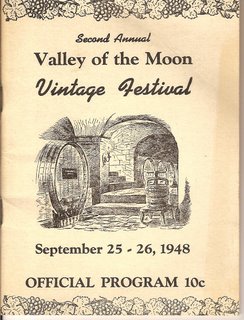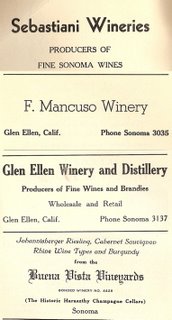This is in response to Clark Smith's posting on his Grapecrafter's blog: the science of minerality , in which no science of his own is presented:Few aspects ring more passionately for lovers of WineSmith wines than their obvious minerality. The source is pretty clear -- living soil. In a recent Wines and Vines article,
Tim Patterson reports that “the one thing we do know is that it has very little to do with minerals.”Sadly, Clark’s already off course by stating his conclusion without any evidence to back it up. Also, the use of the term "living soil" -whatever that means - couches his argument in a corner where it can't be debated without you being painted as a supporter of "dead soil"…In support of this silly conclusion, Tim interviews pundits Ann “Aroma Wheel” Noble and her colleague, analytical chemist Sue Ebeler of UC Davis. Both admit they are unable to make sense of the analytical data on this subject. Amazingly, Tim accepts this professed cluelessness as proof that minerals are unrelated to minerality.Pejorative comments aside, he’s claiming that Noble and Ebeler have erroneously dismissed a link between mineral content & a “minerality perception”. Also, the implication is that the reporter hasn’t got a clue either…I’ve been pursuing the mysteries of minerality for ten years now, most recently with an open-minded group of CSU Fresno investigators. It’s a tricky problem. Atomic absorption data of the elemental content of organic vs conventional wines hasn’t so far yielded simple linear answers as to what minerality is. On the other hand, the sensory data is pretty clean. In other words, minerality quite obviously exists, but we don’t presently know how to measure it.Weird, I would’ve expected him to have found something after 10 years, and working with a group of “open-minded” Fresno prof’s…if a link actually existed, that is…
And his final statement in that paragraph has a grain of the truth in it: perhaps “minerality” is a misnomer in relation to its cause – much like “bell peppers” perception is misleading in suggesting that bell peppers (the vegetable) is responsible for that same aroma in Cabernet, when in fact no bell peppers are ever used in winemaking…Here’s what I’m pretty sure of. There is a characteristic minerally finish to wines which is strongly associated with living soil practices (earthworms, cover crops, abandoning pesticides or herbicides). It has been described as mineral energy, mineral electricity (as it resembles electric current in the throat), and also the flavor one has in the back of the throat after eating half shell oysters or when driving home from the beach. It’s similar to saltiness, but more complex and persistent. We don’t see this characteristic in wines from grapes grown using the methods of petroleum agriculture – bare soil, pesticide use, no earthworms present in the soil. These wines end in the mid-palate, and have a short, blank finish. They also don’t age well.This ties in perfectly with his Biodynamic (BioD) comments on terroir at this link. And for his description of mineral electricity – I’m not sure where one would experience electric current in one’s throat , at least nowhere outside of Abu Ghraib prison or GITMO (“double-blindfolded tastings, anyone?”)…or that it would be nearly as enjoyable as water-boarding. How quaintly Rumsfeldian…
The over generalizations used to argument in favor BioD ag are obvious as many conventionally produced wines can and do age well.We Grapecrafters have a healthy respect for minerality for several reasons. Mosel rieslings, strong in this sensory characteristic, can age 30 years, whereas Californian and Australian rieslings die like dogs within five years. Second, when we micro-oxygenate (a process which involves continuous sensory and analytical testing for the wine’s ability to take up the oxygen without signs of overwhelm, such as a rise in dissolved oxygen, aldehyde creation or open fruit expression), wines with minerality tend to take up much more oxygen than their dead-soil counterparts. Third, minerality imparts a liveliness on the palate and a lengthy flavor persistence that sets living soil vineyards apart from other New World wines.WHOA! Whoa, Nellie!
Did he just suggest using a “wine manipulation”? Why YES, of course he did… this is Clark Smith of Vinovation fame! The man would love to sell you his services…a little RO to remove an objectionable VA problem? Sure! He can do it! Reduce pesky alcohol after picking faaaaar toooo ripe? That’s no problem with Clark around!
And again, more over-generalizations to support his point of view. The comment about more O2 uptake by wines with minerality leads away from his purported view that it's due to mineral content, and implies that there may be a reductive winemaking technique that could be responsible for part of the perception. Sadly he fails to follow that line...Pre-empting discussion is the favorite ploy of the pundits of UC Davis. These folks did not receive media training in their scientific curriculum. They’re just busy people with well-defined self-proclaimed research agendas largely unrelated to any practical needs of winemakers and unanchored in observable phenomena. In general, they display impatience with educating the public and tend to chose end runs around serious discussion of challenging issues.The only thing pre-emptive so far is his use of a “straw dog” to position the UCD crew in an untenable place. Geez, Clark, do you have some issues with UCD or what? And he misses his chance to announce his own agenda of wanting to market himself and his services to the reader. “Impatience with educating the public”?? Wait, these people are professional educators at a public university…what the hell’s this guy talking about…?
And the end run we’ve seen around this subject has been entirely Clark’s…Science operates through hypothesis testing. In layman’s terms, you give an idea the benefit of the doubt, play with it, and see whether it gives back anything productive. Sorry Ann -- you get precisely nowhere if you don’t play. That doesn’t disprove effects the rest of us clearly see.Again, it’s a straw dog. And his own hypothesis testing of the past decade apparently have been fruitless as well.
Ann & Sue haven’t dismissed “minerality” as a perception…they’ve just reported that they can find no link between it and mineral content in the wines in question…a finding he corroborates.
Now I’ve been aware of Clark for about a dozen years, and don't have anything against the services he offers nor anyone who uses them, but after reading this blog of his – at least this and his Terroir entry - I’d have to say I’m more confident trusting Ann & Sue’s analyses than his.The pre-emptive ploys of UC Davis “experts” manifest all over the scientific community. We haven’t really investigated the agricultural effects of phases of the moon, or biological effects of high tension electrical power lines. But lots of lazy (or financially interested) scientists use the smokescreen of “inadequate evidence” to divert attention from their own ignorance.Again, he’s the one being pre-emptive. As for the BioD drivel regarding EMF/Highpower lines, lunar phases, etc, well, sorry Clark, but they have been repeatedly studied, and continue to show nothing fruitful nor conclusive.
Clark also doesn’t want you to see how he’s positioned himself as the “expert” by implication…and his argument smacks of laziness, and he is MOST CERTAINLY financially interested in you believing he IS an expert so he can hustle his services.Tim, you’re a good journalist, but this time you got suckered by the pros. You’re not the first. But you appointed them “experts,” and all they’re really telling you is they really aren’t. Don’t buy into this nonsense. The oldest trick in the book is denying a phenomenon exists because you can’t explain it. It’s an amazing ruse -- the dumber you are, the more you get to deny.Would the second oldest ruse then be putting words in your opponent’s mouth to place them in indefensible positions, and then cutting them to shreds?
Have you no sense of decency, Sir?Our trials at Fresno State are at least inquiring into the nature of this obvious phenomenon. Meantime, take heart – the sky is blue whether Ann Noble can see it or not.Right. UCD is closed-minded, while Fresno State is a lone bastion of noble inquiry…how ridiculous…
But I do hope you are inquiring into the nature of the perception. Hopefully, your white paper on the results will be less vitriolic, dismissive and pejorative, and more substantive as to the reasons people actually perceive this “minerality”.Good night, and good luck, Sir.Labels: biodynamic, terroir
 Interesting thing within the program from the 1948 Sonoma Valley Vintage festival - only 4 wineries are buying ad space at that time! Sebastiani, Mancuso (which is long since defunct), Glen Ellen and Buena Vista.
Interesting thing within the program from the 1948 Sonoma Valley Vintage festival - only 4 wineries are buying ad space at that time! Sebastiani, Mancuso (which is long since defunct), Glen Ellen and Buena Vista. Also of note is a small blurb regarding Count Agoston Harazathy and the increase in California's wine production from 1850 (total production for the entire State was - get this - 58,055 gallons, or ~24,200 cases!) until 1946-47 (when it had increased to a whopping 177,000,000 gallons - or roughly 73.75 million cases equivalent...).
Also of note is a small blurb regarding Count Agoston Harazathy and the increase in California's wine production from 1850 (total production for the entire State was - get this - 58,055 gallons, or ~24,200 cases!) until 1946-47 (when it had increased to a whopping 177,000,000 gallons - or roughly 73.75 million cases equivalent...). Interesting thing within the program from the 1948 Sonoma Valley Vintage festival - only 4 wineries are buying ad space at that time! Sebastiani, Mancuso (which is long since defunct), Glen Ellen and Buena Vista.
Interesting thing within the program from the 1948 Sonoma Valley Vintage festival - only 4 wineries are buying ad space at that time! Sebastiani, Mancuso (which is long since defunct), Glen Ellen and Buena Vista. Also of note is a small blurb regarding Count Agoston Harazathy and the increase in California's wine production from 1850 (total production for the entire State was - get this - 58,055 gallons, or ~24,200 cases!) until 1946-47 (when it had increased to a whopping 177,000,000 gallons - or roughly 73.75 million cases equivalent...).
Also of note is a small blurb regarding Count Agoston Harazathy and the increase in California's wine production from 1850 (total production for the entire State was - get this - 58,055 gallons, or ~24,200 cases!) until 1946-47 (when it had increased to a whopping 177,000,000 gallons - or roughly 73.75 million cases equivalent...).





